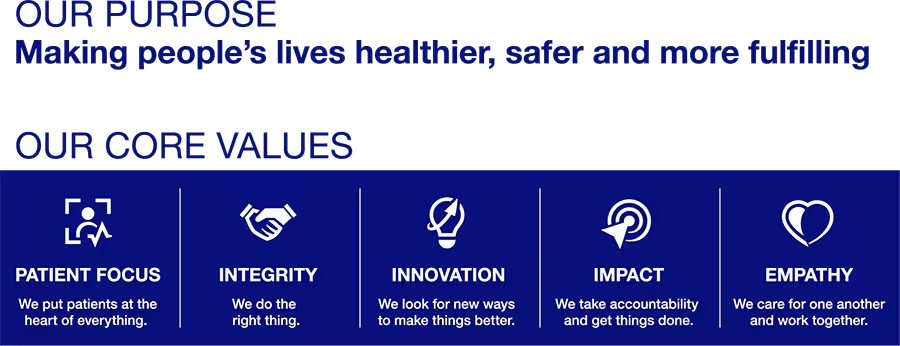March 2025
Focus Area 3: Responsible Supply Chain

The Olympus Group has adopted a responsible supply chain as one of its Focus Areas. Here, the head of Global Procurement Excellence & Performance shares their vision and initiatives for mitigating supply chain risk, ensuring resilience, and working with vendors to address sustainability.

Ranna Rose
Director, Global Supply Chain Risk Management
Ranna Rose is the Global Director of Supply Chain Risk at Olympus Corporation, responsible for leading ESG, BCP (Business Continuity Planning) , and supplier compliance initiatives. She drives sustainable procurement strategies, ensuring suppliers meet evolving regulatory and ESG requirements through supply chain transparency. With extensive experience in the information technology and manufacturing industries , Rose specializes in multi-tier risk management, supplier engagement, and implementing ESG frameworks that enhance resilience and responsible sourcing across global supply chains.
Strengthening resilience of the supply chain, a critical foundation of business continuity
Q. What initiatives are being undertaken to reduce supply chain risks and enhance resilience?
A. We are focusing on data-driven risk management and building strong supplier relationships.
Olympus plays a vital role in the healthcare industry, and enhancing the resilience of our supply chain ensures the uninterrupted supply of medical devices to customers worldwide. In line with this, we place a strong emphasis on building a robust and sustainable network to support our global operations. One specific means of achieving this is to utilize advanced technologies—such as a global risk management tool—to visualize the entire global supply chain at multiple levels, and evaluate risks not only for direct suppliers but also for their sub-tiers.
Sources of risk, such as geopolitical issues; natural disasters; and cybersecurity threats, are monitored in real time, not only at the supplier level but also at each company and site used by that supplier. Should an incident occur, we have features such as event monitoring, which enables us to receive immediate alerts; and impact mapping, which quickly assesses how the incident’s impact might ripple through our supply chain.
Q. How are your initiatives making use of such functionality?
A. Based upon data and information, we are expanding our emergency preparedness and implementing rapid response systems.
Impact mapping is a particularly important function, as it provides information on which we can base quick decisions—such as whether to initiate contingency plans, or seek alternate suppliers. Thanks to this, we are able to swiftly take appropriate action that minimizes impact. We conduct BCP (Business Continuity Planning) surveys for each of our suppliers, and directly support those needing improvement by promoting their understanding of, and assisting with, BCP enhancements (to the high standards of ISO 22301). Additionally, we provide crisis management support during disruptions, working closely with suppliers to activate their BCPs; minimize impacts; and efficiently restore operations. The key thing is that both we and our suppliers are prepared for unforeseen circumstances, and are able to minimize the impact of these upon patient safety.
Pursuing sustainability in collaboration with suppliers
Q. What are your specific initiatives relating to sustainability (ESG: Environmental, Social, and Governance)?
A. We conduct ESG evaluations, identifying the support and collaboration needed for each supplier.
ESG questionnaires are sent to suppliers, to collect and then analyze data on their sustainability activities. Through these evaluations, which encompass energy efficiency; waste reduction; and compliance with ethical labor practices, we identify areas and opportunities for collaboration with suppliers. We adopt science-based targets, such as greenhouse gas reduction, and encourage reporting on environmental performance. In addition to new regulatory requirements, such as PFAS regulations and the EU Deforestation Directive, we are also addressing cybersecurity, including by meeting data protection standards.
This data is fed back into our ESG strategy, leading to the creation of a resilient, sustainable, and compliant supply chain that is aligned with global standards and societal goals.
Q. What do you emphasize in promoting sustainability together with suppliers?
A. We value trust and transparency in relationships with suppliers, regarding them as partners as well as simply vendors.
We take a supplier-centric approach, treating our suppliers as strategic partners rather than mere vendors. Since this is a partnership, we not only conduct assessments for suppliers, but also provide training and other support to help them comply with regulatory requirements. At the Olympus Group, our management believes in ESG, BCP, and the importance of transparency. Accordingly, they directly support and engage with our partners worldwide.
Tackling micro-level challenges from a macro perspective
Q. How do you perceive your role as head of Global Procurement Excellence & Performance?
A. It is not only about improving operational efficiency in procurement, but also about building a supply chain that is aligned with the group’s strategies and goals.
The key mission is to realize procurement that is not only operationally efficient, but that also aligns with Olympus’ strategies and objectives, including resilience, sustainability, and innovation. To that end, I recognize my focus areas as the building of a global supplier risk management program, overseeing BCP strategies, advancing ESG initiatives, and ensuring compliance with global standards and regulations.
Q. What is the key to making these initiatives successful?
A. Collaboration that values mutual understanding and respect.
Building relationships founded on trust and transparency is essential, whether with suppliers, internal teams, or regulatory authorities. In supplier partnerships, mutual understanding and cultural respect are key—we prioritize ethical collaboration that aligns with our sustainability commitments. Our success depends on working with people who share these values, making our team a critical asset. Rooted in our core values, we always keep the bigger picture in mind—recognizing that our work not only supports the company’s business objectives, but also contributes to better outcomes for patients and a more sustainable world.

Q. Lastly, what is your message to our stakeholders?
A. Collaboration with you all is at the heart of everything we do.
Suppliers are essential partners in fulfilling our mission—your resilience, innovation, and commitment are crucial to our success. Let’s continue to push boundaries together in areas such as enhancing sustainability and transparency, and responding to new regulations. Our task is not just simple procurement; it’s about building a resilient, ethical, and future-ready supply chain. Let’s work together to bring about meaningful change.
Also recommended
To list of stories







